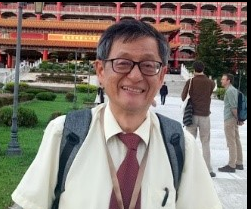
Prof. Bang-Fuh Chen
Center of Excellence for Ocean Engineering, National Taiwan Ocean University, Taiwan, China
Title: Renewable Wave Energy Integration with Seaweed Cultivation
Abstract:
Climate change-induced natural disasters are increasingly prevalent worldwide, underscoring the urgent need to reduce fossil fuel usage for Earth's sustainable survival. Countries are progressively investing in renewable energy sources like wind, wave, tidal, and solar power to diminish reliance on non-renewable fuels and cut carbon emissions. Taiwan, in addition to this energy transition, has delved into marine carbon sinks, particularly oceanic and coastal blue carbon encompassing mangroves, seagrasses, and salt marshes. These ecosystems have the capacity to sequester substantial carbon amounts, converting them into stable forms stored in the soil, thereby mitigating atmospheric carbon dioxide levels.
To meet the rising demand for healthy food, algae such as Sarcodia suae (SS) are recommended for their beneficial compounds and their role in capturing CO2 and removing nutrients from coastal waters. Cultivating SS typically requires maintaining seawater temperatures below 28°C, which necessitates cooling systems, especially in tropical regions. Stirring is also essential to ensure even light exposure and prevent self-shielding during growth. However, cooling and stirring are energy-intensive, leading to a low energy return on investment (EROI) in traditional land-based macroalgae production.
Our study addresses these challenges by designing a Marine Sustainable Aquaculture System (MSAS). This system submerges the breeding tank to keep temperatures below 28°C. A point absorber wave energy harvester with a floating buoy converts up-and-down motion into rotational motion, which drives mixing blades in the tank. This eliminates the need for external cooling and stirring, significantly reducing energy consumption. Using Morison equations, we calculated the wave and current forces and determined the necessary anchoring weights for offshore deployment.
Both lab tests and coastal trials of the MSAS yielded promising results, indicating a low-cost, scalable solution for offshore seaweed cultivation. In summary, our study demonstrates that integrating renewable wave energy with seaweed cultivation effectively overcomes traditional energy inefficiencies and offers a scalable, environmentally friendly solution for marine aquaculture.
Keywords: Sustainable aquaculture, Climate change, Sarcodia suae, EROI
Biography:
Dr. Bang-Fuh Chen completed his PhD in Civil Engineering from University of Pittsburgh in 1989. After working in both the US and Taiwan, he, now, holds the title of Emeritus Professor of the Department of Marine Environment and Engineering, National Sun Yat-sen University, Kaohsiung, Taiwan, as well as an Honorary Chair Professor of the Center of Excellence in Marine Engineering, National Taiwan Ocean University, Keelung, Taiwan. His research interests are computational fluid dynamics, ocean renewable energy, natural sustainability. He obtained more than 50 research grants from the National Science and Technology Council of Taiwan, more than 10 of which are related to marine renewable energy. He also led a multidisciplinary team in academia and industry to complete the open-sea deployment of Taiwan’s first tidal energy system (5KW), which successfully withstood strong typhoons. Dr. Chen has been listed in the top 2% of scientists (released by Stanford University) since 2018.